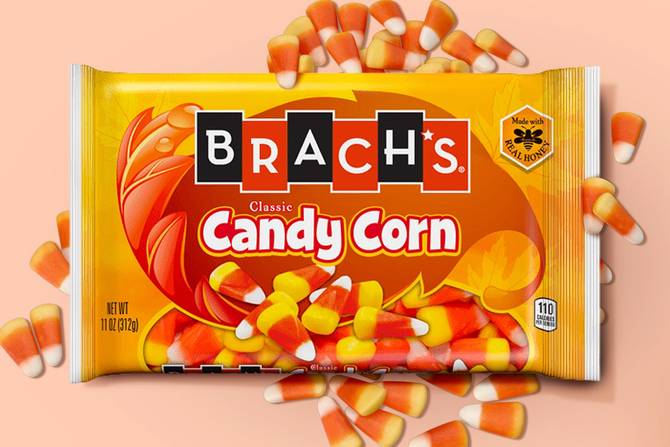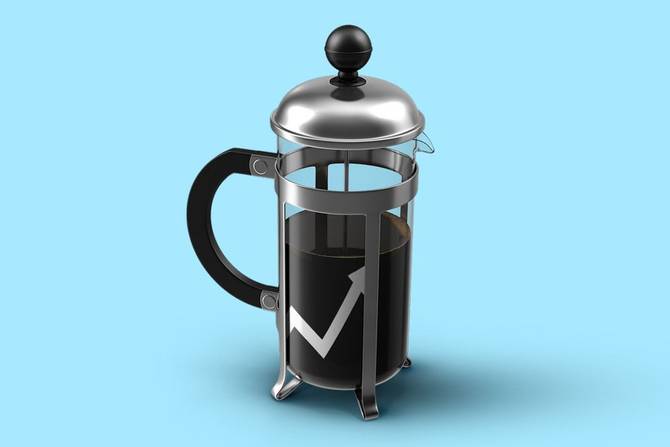Happy Friday before Halloween. Meta this, Meta that. We just want to know if Home Depot’s Skelly will still be to scale in the virtual world being forced upon us.
In today’s edition:
- Brach’s on its Halloween staple
- How lobbying impacts customer satisfaction
- Marketing horror stories

—Phoebe Bain, Zaid Shoorbajee
|
|
|
Brach's
In case you’ve forgotten how dystopian Halloween 2020 was, let us remind you that Reese’s deployed a robot door to roll around and dispense candy to children, while Sour Patch Kids coined the term “reverse trick or treating,” meaning it brought the Kids to the kids via package deliveries.
-
Brach’s also found a
gross unique way to grab attention during the unconventional year.
-
The brand debuted a turkey-dinner-flavored version of its signature candy corn, garnering over 6 million impressions online, which was beyond the team’s “wildest dreams,” according to Katie Duffy, VP and GM of seasonal at Ferrara, owner of Brach’s.
Fun fact: Duffy also told Marketing Brew that the idea for turkey-dinner flavors came 100% from the marketing team.
But other than adding two new flavors to the turkey-dinner pack and bringing back IRL events, Brach’s—which also makes other holiday-themed candies, like conversation hearts, jelly beans, and candy canes—isn’t making any major changes to its Halloween marketing strategy this year. With 86% of candy-corn market share, per Duffy, the brand often finds itself leaning on tradition and the familiarity of its products.
Seeing double
“I don’t know that we’re necessarily doing anything largely differently. We’re still working with our retail partners to make sure that our products are available on the sales floor when people would normally expect it to be,” Duffy explained. She emphasized that for seasonal products like candy corn, it’s best to focus on tradition.
But, but, but: Brach’s started working with e-commerce platforms in 2019. This year, it’s selling the corn on sites like Amazon and GoPuff. But it hasn’t jumped on the direct-to-consumer train.
- Last year, Brach’s candy corn brought in more than $60 million, while Ferrera’s Halloween non-chocolate candy retail sales as a whole made $120 milion.
- Additionally, Duffy told us that candy-corn consumers have a high repeat rate of purchase throughout the Halloween season, meaning that they’re likely to purchase the candy more than once per #spookyszn.
More treat than trick: “In food and beverage and the holiday season, there’s such strong ties to tradition and nostalgia. And some brands that are able to really lean on that and don’t need to be reminding consumers about how timely and relevant they are around Halloween or Thanksgiving,” Emily Moquin, food and beverage analyst at Morning Consult, explained.
For example, every year there’s some debate on social media about whether candy corn is a disgusting relic of the 1950s, or the best part of trick or treating. Brach’s could easily generate some attention for the brand if it were to chime in on this debate.
But Duffy told us the brand tries to engage more positively with its products, and that the marketing team really doesn’t love “engaging with the haters.”
Read the full story here.—PB
|
|
|
Francis Scialabba
Companies and special-interest groups spend billions each year on lobbying, trying to achieve policy outcomes beneficial to them by courting lawmakers and policymakers. But a team of academic researchers has found that this American pastime, although a financial boon to companies that engage in it, can negatively affect customer satisfaction.
Their study, recently published by the American Marketing Association in the Journal of Marketing, also offers marketing-based solutions to mitigate these effects.
Gautham Vadakkepatt, an author on the study and associate professor of marketing at George Mason University’s School of Business, explained that there have been numerous academic studies about how lobbying positively impacts a company’s finances, but few, if any, have looked at its impact on customers.
“So we know that lobbying has a positive impact on financial performance. Does this have any consequence on consumer outcomes?” Vadakkepatt told Marketing Brew.
-
To find out, the research team looked at lobbying data from dozens of publicly traded companies from 2000 to 2014, plus data from the American Customer Satisfaction Index, which surveys Americans about the quality of the products and services they use.
Results: The researchers found an inverse trend between customer satisfaction and how much companies spent on lobbying. The question then becomes how to explain the trend: Why would lobbying be linked with lower customer satisfaction? Vadakkepatt told us the answer is attention.
“We conjecture that because companies’ attention is being spread across multiple domains, the focus on customers can go down, and therefore hurt customer satisfaction,” he said.
Click here to read about how the researchers measured attention on customer-related issues, as well as about how marketing can play a role in reducing the customer satisfaction loss that comes with lobbying.—ZS
|
|
TOGETHER WITH MORNING CONSULT
|
|
Ah, the million-dollar question. With a wonky supply chain, the lasting effects of the pandemic, and shifting consumer plans, figuring out a way forward is A LOT.
So for clarity and insight, Morning Consult created their comprehensive Holiday Season Tracker for 2021, designed to report consumer trends with those mentioned factors—and more—in mind. Their page is updated weekly with new data, analyses, and original reporting to give retailers a roadmap to the most significant shopping trends this season.
And you wouldn’t say they’re willy-nilly about it either. It’s all broken down by age group, holiday, consumer feedback, and more.
As consumer plans shift with changing pandemic conditions, retailers can review Morning Consult’s handy-dandy data for the week to see exactly what that could mean for them.
Get the deets with Morning Consult’s Holiday Season Tracker here.
|
|
|
Giphy
Even if your Halloween weekend plans are more pumpkin patch, less horror-movie screening, you’ll probably relate to these scary stories from marketers. In honor of the holiday, the ghouls and goblins of Madison Avenue told Marketing Brew the spookiest things that happened to them this year.
Responses have been lightly edited for length and clarity.
The Gen Z: “That one time our VP of marketing’s influencer sister dunked on our TikTok game.” —Allyssa Eclarin, director of product marketing at Postal.io
The stranger: “We were doing an activation for a big show premiere with a celebrity and a movie star, which constituted a Twitch stream on the celebrity’s channel. The celebrity shared his Twitch handle, which was included in all the show’s marketing surrounding the stream, as well as his own personal promotion of the event on social media. The stream launched…and we quickly realized that the celebrity gave us the wrong handle. All of the fans were guided to the wrong person’s channel!” —Irina Shames, SVP of strategy and revenue at 3BlackDot
The Zuck returns: “Facebook and Instagram coming back to life after the outage—top most scary thing of 2021, tbh.” —Chi Thukral, head of content marketing at Yanko Design
The “Man in the Mirror”: “I often notice a lot of imitation in what I create or strategize around, which is all good, until I noticed someone was semi-impersonating me. They used a bunch of personal content (Instagram, Instagram Stories, Twitter) I created (some in collaboration with brands) and even had my photo as their profile picture, but they kept their own name and location, and their links led to a blog of some sort that they were trying to promote as their own. Imitation may be flattery until it isn’t I guess.” —Charles Etoroma, social content manager at Warby Parker
If you think you can top any of these, hit reply to this email and try to give us a fright.—ZS, PB
|
|
-
Oil execs from ExxonMobil, BP, Chevron, and Shell were questioned by a House panel about their roles in spreading climate disinformation.
-
Comcast reported ad-revenue growth of 4.6% Q3 year over year, despite paltry Olympics ratings on NBCU’s platforms. The company was also cagey about new signups on Peacock.
-
Instagram scrapped the Reshare button it was testing in the Stories feature.
-
Disney restructured the marketing and communications divisions that cover ABC, Hulu, and general entertainment.
-
KFC hired a former Nintendo executive as its new CMO. We think this means Colonel Sanders will be in the next Super Smash Bros.
|
|
|
|
Here’s the deal: People love deals. This holiday season, you might be planning to reconnect with your customers by tapping into the power of the deal. But how? Use this report from Vericast as a guide. It’ll walk you through which promotional strategies make the “nice” list, and which are naught worth your time. Download Vericast’s report here.
|
|
|
Francis Scialabba
There are a lot of bad marketing tips out there. These aren’t those.
Instagram: At last, the links belong to the people. IG just made link stickers in Stories available to everyone on the platform. Here’s what that means.
Direct response: Getting the right response from an ad is tricky, especially when you’re trying to get an instant one. Here’s a guide on how to effectively carry out direct response marketing.
TikTok: When you’re not getting hypnotized by your For You page, you can use the app to grow your brand. The company put together these tips and success stories for small businesses.
Funnel fix: Inbound leads slip through the cracks more often than they should. With Distro by Chili Piper, you can route leads instantly to the right rep and distribute them fairly and accurately. Fix your funnel with Chili Piper today.*
*This is sponsored advertising content
|
|
Catch up on a few Marketing Brew stories you might have missed.
|
|
AD TECH COMPANY OR CELEBRITY CHILD NAME?
|
Unsplash
There are a lot of questionably named companies in the murky marketing universe. Two of these are real ad tech companies. The rest are celebrity child names. Can you tell them apart? Keep scrolling for the answers.
- Zaius
- Raddix
- Dweezil
- Viant
- Exton
|
|
|
You're 2 referrals away from earning Morning Brew stickers.
Don't leave your laptop feeling naked. Cover it up with these Morning Brew stickers.

Hit the button below to learn more and access your rewards hub.
Click to Share
Or copy & paste your referral link to others:
morningbrew.com/marketing/r/?kid=303a04a9
|
|
AD TECH COMPANY OR CELEBRITY CHILD NAME ANSWERS
|
Raddix is the child of Cameron Diaz and Benji Madden. Exton’s parents are Robert Downey Jr. and Susan Downey. Frank Zappa and Adelaide Gail Zappa named one of their kids Dweezil. (Vogue)
But let’s be real: This doesn’t rule out Zaius and Viant from eventually being celebrity baby names.
|
|
|
Written by
Zaid Shoorbajee and Phoebe Bain
Was this email forwarded to you? Sign up
here.
WANT MORE BREW?
Industry news, with a sense of humor →
-
HR Brew: analysis of the employee-employer relationship
Tips for smarter living →
 Podcasts →
Business Casual
and
Founder's Journal
Podcasts →
Business Casual
and
Founder's Journal
Accelerate Your Career →
-
MB/A: virtual 8-week program designed to broaden your skill set
|
ADVERTISE
//
CAREERS
//
SHOP
//
FAQ
Update your email preferences or unsubscribe
here.
View our privacy policy
here.
Copyright ©
2021
Morning Brew. All rights reserved.
22 W 19th St, 8th Floor, New York, NY 10011
|
|











